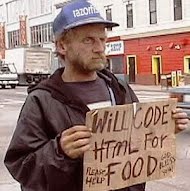Let them eat Tweets

I thought Liz Smith was on to something when I blogged back in March about her prediction that "We're going to have the Internet even when we don't have things to eat." But who knew than an off-hand comment from an octogenarian New Yorker would come to bear so quickly right here in San Francisco?
This past weekend's Wall Street Journal reported on the growing number of homeless people with Facebook pages, Twitter accounts, and email addresses. According to the paper, "In America today, even people without street addresses feel compelled to have Internet addresses."
It seems absurd at first, but is it really?
Think about the increasing numbers of people who devote hours to networking on LinkedIn while unemployed. Or those of us who can easily go weeks without speaking to family and longtime friends, but regularly spend hours keeping up with strangers' blogs or "interacting" with Facebook friends and Twitter followers-- many of whom we've only met in real life once or twice. Are we all really any different than the homeless people staking their claims on the Web?
I know the Internet can be exciting and beneficial-- I mean, I'm here, aren't I?-- but I try to be wary of the allure of "social media" and its rapid rise in popularity. There's something of the placebo effect in it all-- and I think it's important to be vigilant about what we're neglecting or sacrificing in the real world as we're busy cultivating our online "lives."
A bug's eye view on African aid

This past weekend's WSJ had a great piece written by an African woman, Dambisa Moyo, with a unique view on foreign aid to Africa.
I really have no strong, well-formed personal opinion on the matter. Well, that's not exactly true-- I was happy to see the WSJ somewhat affirm my gut feeling that Project Red is sketchy at best and ineffective at worst. Even I, a faithful Goop subscriber, can't pretend that this wasn't one of the most misguided ad campaigns ever.
Anyway, the WSJ article is long and somewhat complicated. Though it's worth reading the whole thing, I've pasted what I think is the 'nut graf' (journo speak for the part that tells you in a nutshell what you need to know) here:
Even what may appear as a benign intervention on the surface can have damning consequences. Say there is a mosquito-net maker in small-town Africa. Say he employs 10 people who together manufacture 500 nets a week. Typically, these 10 employees support upward of 15 relatives each. A Western government-inspired program generously supplies the affected region with 100,000 free mosquito nets. This promptly puts the mosquito net manufacturer out of business, and now his 10 employees can no longer support their 150 dependents. In a couple of years, most of the donated nets will be torn and useless, but now there is no mosquito net maker to go to. They'll have to get more aid. And African governments once again get to abdicate their responsibilities.